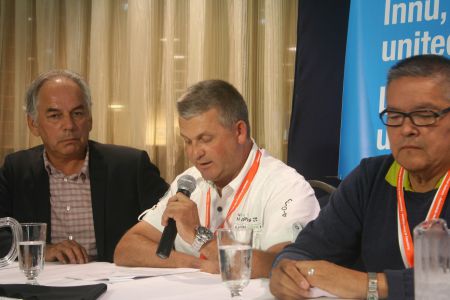K'JIPUKTUK (Halifax) - A coalition of Innu, Maliseet and Mi'gmaq Nations bordering the Gulf of St. Lawrence is taking a firm stand against any oil exploration in the Gulf in the foreseeable future.
"We are calling for a 12-year moratorium on oil exploration and development in the Gulf," Chief Claude Jeannotte (Micmac Nation of Gespeg) told a press conference held today at the Halifax World Trade and Convention Centre.
“Our rights include the right to earn a moderate livelihood and to enjoy the rich bounty of the Gulf, to use the Gulf for our food, social and ceremonial purposes,” said Chief PJ Prosper of Paqtnkek Mi’kmaw Nation, speaking on behalf of the Assembly of Nova Scotia Mi'kmaq Chiefs..
“We intend to protect our way of life, and we take the responsibility bestowed upon us by our Creator very seriously,” Prosper said.
If drilling were to occur anytime soon it will undoubtedly happen in an area of the Gulf known as Old Harry, about 80 kilometers east of the Magdalen Islands and right on the cusp of the territorial boundary between Québec and Newfoundland.
Old Harry is believed to contain two-billion barrels of oil, which makes it almost twice the size of the Hibernia oil field. It also holds seven-trillion cubic feet of natural gas.
Environmentalists have raised concerns around seismic testing and the risk of spills within a mostly land-locked and ecologically very sensitive Gulf. They have also warned about the difficulties containing a spill under severe winter ice conditions.
Nonetheless Newfoundland recently approved development at the Old Harry site in principle. Many politicians in Quebec are eager to start exploration of that province's share of Old Harry, but are facing hurdles.
The First Nations coalition has no confidence in the assessments conducted by the Canada-Newfoundland and Labarador Offshore Petroleum Board (C-NLOPB).
"There must be a distinct process to study the entire gulf as one ecosystem," said Jeannotte. "This process must be carried out independently from those petro boards whose track records demonstrate that they are more interested in drilling than in the environment that our people and all Atlantic Canadians depend on."
Environmentalists have long argued that oil exploration should not proceed in the ecologically sensitive Gulf of St. Lawrence. Their concerns have mostly been ignored.
But the First Nations coalition possesses powers other than those of persuasion.
"We have a valid legal claim," Troy Jerome, spokesperson for First Nations coalition told the Halifax Media Co-op.
"The Supreme Court has recognized our treaties. The 1999 Marshall decision gives us the constitutionally protected right to earn a moderate livelihood. We believe we have a strong case," said Jerome.
Strong enough for a judge to halt development if the C-NLOPB and the federal government continue to ignore the First Nations, Jerome believes.
"There is so much oil under the ground. The Gulf is one place where we should keep it under the ground, because of the very precious ecosystem out there," Jerome said.
As the Chiefs addressed the press conference three fishing vessels belonging to the Mi'gmaq of Gespe'gewa'gi (Gaspé) arrived at Old Harry and left a buoy symbolizing the First Nations' claims on the territory.
See also:
Blue whale, black oil and the race for the Gulf
Newfoundland Petroleum Board gives go ahead to oil and gas exploration in the Gulf of St. Lawrence
Hunt for oil in the Gulf of St. Lawrence intensifies
Drilling for oil off the coast of Nova Scotia
Follow Robert Devet on Twitter @DevetRobert




